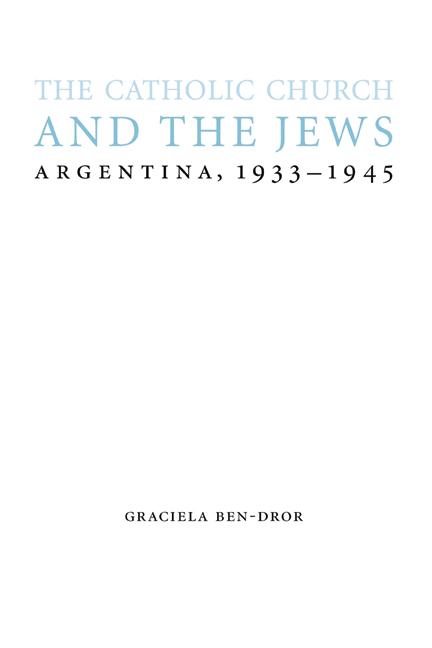
Zustellung: Sa, 19.07. - Do, 24.07.
Versand in 2 Wochen
VersandkostenfreiBestellen & in Filiale abholen:
The impact of events in Nazi Germany and Europe during World War II was keenly felt in neutral Argentina among its predominantly Catholic population and its significant Jewish minority.
The Catholic Church and the Jews, Argentina, 1933-1945 considers the images of Jews presented in standard Catholic teaching of that era, the attitudes of the lower clergy and faithful toward the country's Jewish citizens, and the response of the politically influential Church hierarchy to the national debate on accepting Jewish refugees from Europe. The issue was complicated by such factors as the position taken by the Vatican, Argentina's unstable political situation, and the sizeable number of citizens of German origin who were Nazi sympathizers eager to promote German interests.
Argentina's self-perception was as a "Catholic" country. Though there were few overtly anti-Jewish acts, traditional stereotypes and prejudice were widespread and only a few voices in the Catholic community confronted the established attitudes.
The Catholic Church and the Jews, Argentina, 1933-1945 considers the images of Jews presented in standard Catholic teaching of that era, the attitudes of the lower clergy and faithful toward the country's Jewish citizens, and the response of the politically influential Church hierarchy to the national debate on accepting Jewish refugees from Europe. The issue was complicated by such factors as the position taken by the Vatican, Argentina's unstable political situation, and the sizeable number of citizens of German origin who were Nazi sympathizers eager to promote German interests.
Argentina's self-perception was as a "Catholic" country. Though there were few overtly anti-Jewish acts, traditional stereotypes and prejudice were widespread and only a few voices in the Catholic community confronted the established attitudes.
Inhaltsverzeichnis
Foreword by Haim AvniAcknowledgmentsIntroduction
PART I: THE CATHOLIC CHURCH IN ARGENTINA AND ANTISEMITISM 1. The Consolidation of the Catholic Church in Argentina2. The Consolidation of Antisemitism3. The Stance of the Catholic Hierarchy toward the Jews4. The Turning Point: The Military Coup and "Catholic Argentina, 1943-1945
PART II: THE CATHOLIC CHURCH IN ARGENTINA AND ITS ATTITUDE TO NAZISM AND THE HOLOCAUST 5. The Position of the Catholic Hierarchy in Argentina on the Nazi Regime6. The Attitude of the Clergy to Nazism and the Jewish Refugees7. The World War and Its Implications for the Argentinean Church 8. The Argentinean Church and the Plight of European Jewry, 1938-19429. The Reaction of Argentine Catholics to the Mass Murder of European Jews, 1942-194310. The End of the War: Turning Point or Continuation?11. Summary
Index
PART I: THE CATHOLIC CHURCH IN ARGENTINA AND ANTISEMITISM 1. The Consolidation of the Catholic Church in Argentina2. The Consolidation of Antisemitism3. The Stance of the Catholic Hierarchy toward the Jews4. The Turning Point: The Military Coup and "Catholic Argentina, 1943-1945
PART II: THE CATHOLIC CHURCH IN ARGENTINA AND ITS ATTITUDE TO NAZISM AND THE HOLOCAUST 5. The Position of the Catholic Hierarchy in Argentina on the Nazi Regime6. The Attitude of the Clergy to Nazism and the Jewish Refugees7. The World War and Its Implications for the Argentinean Church 8. The Argentinean Church and the Plight of European Jewry, 1938-19429. The Reaction of Argentine Catholics to the Mass Murder of European Jews, 1942-194310. The End of the War: Turning Point or Continuation?11. Summary
Index
Produktdetails
Erscheinungsdatum
01. Januar 2009
Sprache
englisch
Seitenanzahl
278
Autor/Autorin
Graciela Ben-Dror
Verlag/Hersteller
Produktart
gebunden
Gewicht
567 g
Größe (L/B/H)
231/160/25 mm
ISBN
9780803218895
Entdecken Sie mehr
Pressestimmen
"A significant contribution to Argentine and Jewish history."--J. L./i>--J. L. Elkin "CHOICE "
Bewertungen
0 Bewertungen
Es wurden noch keine Bewertungen abgegeben. Schreiben Sie die erste Bewertung zu "The Catholic Church and the Jews" und helfen Sie damit anderen bei der Kaufentscheidung.









